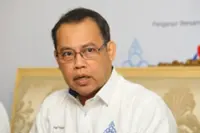PETALING JAYA: Sunway Group founder and chairman Tan Sri Sir Dr. Jeffrey Cheah KBE AO says receiving Japan’s Order of the Rising Sun award is not just a personal honour but a recognition of the dedication as well as commitment of the Sunway Group and Jeffrey Cheah Foundation teams.
“This honour is far greater than a personal accolade; it is a tribute to the invaluable contributions of the many partners and stakeholders affiliated with Sunway Group and the Jeffrey Cheah Foundation.
“Their steadfast dedication to fostering deeper bilateral ties, mutual understanding, and enduring friendship between the people of Malaysia and Japan is what makes this recognition truly meaningful,” Cheah told StarBiz.
The 80-year-old entrepreneur is one of the few Malaysians to be awarded the prestigious decoration of honour by the Japanese government.
In a Facebook post on Tuesday, the Japan embassy in Malaysia said Cheah was specifically awarded the Order of the Rising Sun, Gold Rays with Neck Ribbon in recognition of his contributions towards promoting academic exchange and improving economic relations between Japan and Malaysia.
“I am deeply honoured and humbled by the conferment of this prestigious award by His Majesty the Emperor of Japan.
“I would like to extend my heartfelt gratitude to the government of Japan for endorsing my nomination and to His Excellency Noriyuki Shikata, ambassador of Japan to Malaysia, who personally conveyed this news during his courtesy visit to Sunway City Kuala Lumpur yesterday (Tuesday),” Cheah said.
He added that Japan has long served as a beacon of resilience, innovation, and discipline – principles that have profoundly shaped both his personal outlook and professional endeavours.
“From rebuilding in the aftermath of World War II to emerging as a global leader across multiple industries, Japan stands as a testament to the transformative power of perseverance and visionary leadership.
“It is these very qualities that have inspired me and continue to guide the work we do at Sunway and the Jeffrey Cheah Foundation,” he said.
Cheah added the relationship between Malaysia and Japan is marked by deep mutual respect, cultural appreciation, and long-standing economic ties, as evidenced by Japan’s position among Malaysia’s top five trading partners.
“I have always believed that to be the best, we must work with the best and learn from the best. Malaysia and Sunway have certainly benefited and learned from the very best that Japan has to offer,” he says.
This is the reason why Sunway University has established partnerships with more than 20 Japanese universities.
He added that eight more partnerships would be established over the next few months, focusing on research collaboration, student exchange, and technological innovation.
“Sunway University’s emergence as a top private university in Asean is enabled through its strategic transboundary partnerships including those with Japanese institutions – supporting its mission as an education-focused, research-intensive and impact-driven university,” he said.
For instance, Sunway iLabs and the Japan External Trade Organisation Kuala Lumpur have been working together for more than five years to facilitate the entry of Japanese startups into the South-East Asian market, using Malaysia as a launchpad.
“This partnership has led to the acceleration of a number of startups, and the launch of pilot projects, and significant funding investments for technology localisation and commercialisation across South-East Asia.
“The most recent initiative, the Green Transformation Accelerator Programme, focuses on driving sustainability through innovation in areas such as food security, renewable energy, circular economy and resilient cities,” Cheah said.
Further, in collaboration with Japanese companies Aerosense Inc and Funlead Corp, Sunway University is also involved in a research project aimed at mangrove forest conservation and sustainable management.
“This project employs drone technology and artificial intelligence for data acquisition and image analysis to monitor and conserve mangrove ecosystems along the Sarawak River.
“The initiative exemplifies the application of human-machine collaboration for environmental sustainability,” Cheah pointed out.





